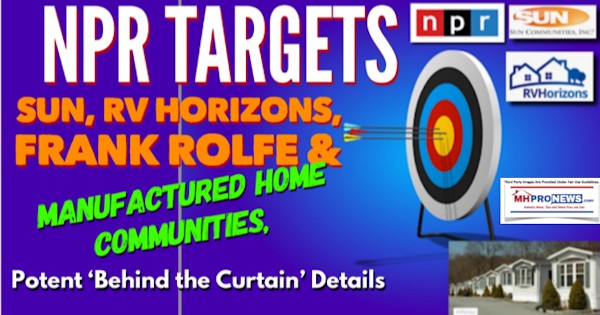
NPR’s Anna Casey begins her narrative about manufactured homes and communities with two errors in her first very sentence. She missed the estimated totals and is mostly incorrect about the proper terminology for this type of factory-built housing.
“Roughly 20 million Americans live in mobile homes, once billed as low-cost living. But mobile home parks have become a target investment for real estate companies who are jacking up fees,” begins Casey’s NPR narrative, a lead-in to her radio interview transcript.
Their headline?
“Mobile Home Owners Are Upset About Rising Costs To Rent Land.” That too is at best only partially correct, as there are actually some 22 million Americans living in millions of pre-HUD Code mobile homes, and more post-HUD Code manufactured homes. Why does Casey say, “…once billed as low cost living…” – does anyone who studies the facts doubt that manufactured home living is less costly than other housing options?
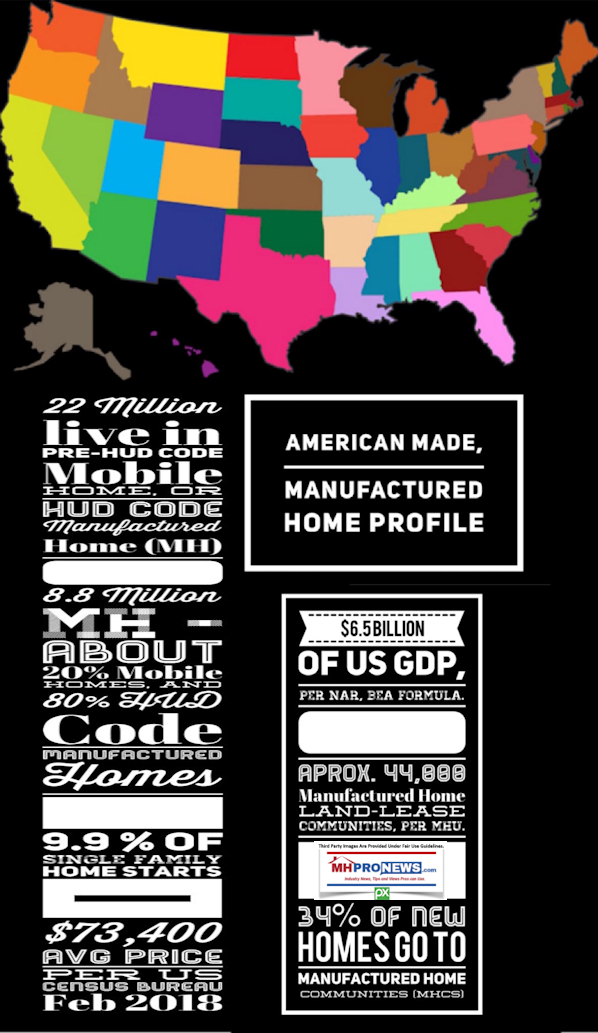
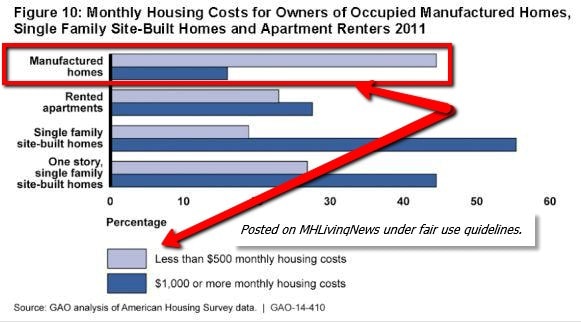
The end of NPR’s article has this disclosure:
NPR transcripts are created on a rush deadline by Verb8tm, Inc., an NPR contractor, and produced using a proprietary transcription process developed with NPR. This text may not be in its final form and may be updated or revised in the future. Accuracy and availability may vary. The authoritative record of NPR’s programming is the audio record.
That audio is found below.
To set the context for the potential impact of this type of public media ‘journalism,’ “According to Nielsen Audio Fall 2017 ratings, the total weekly listeners for all programming on NPR stations is 37.7 million people – a record that has been maintained since the Spring of 2017. NPR’s Newscasts, updated live every hour, can now be heard on 947 broadcast stations by nearly 28.7 million listeners,” said NPR on Mar 28, 2018. NPR says that about 2/3 are white listeners, with the balance being members of a minority group.
Numbers of NPR affiliated stations operate in rural areas that may be underserved by other competing news radio stations. Put differently, in the very markets where manufactured housing sales are often the strongest – due to placement issues in towns across America – NPR broadcasts like this one may be one of the only radio news sources.
Before going deeper into this Daily Business News on MHProNews report and analysis, ICYMI, this is a good place to see part one of this series on PBS and NPR for useful background.
PBS & NPR Reporting on Manufactured Housing News, Pulling Back the Veil
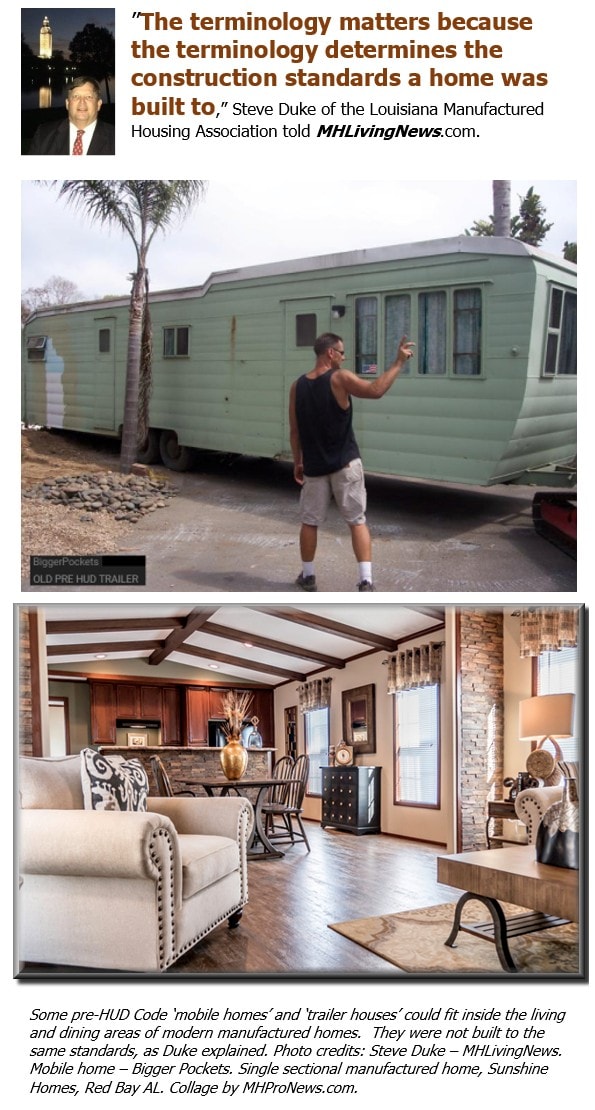
the terminology determines the
construction standards a home was
built to,” Steve Duke, LMHA.
Next, after the graphics that follow is the full NPR transcript, from the audio posted above. Following that NPR transcript, MHProNews will provide analysis.
We note again, via the graphics above and below, that NPR is routinely misusing the terminology. They and PBS have often done so over the course of several years. One might ask out loud, why? Why are they using outdated, inaccurate, or even prejudicial terminology?
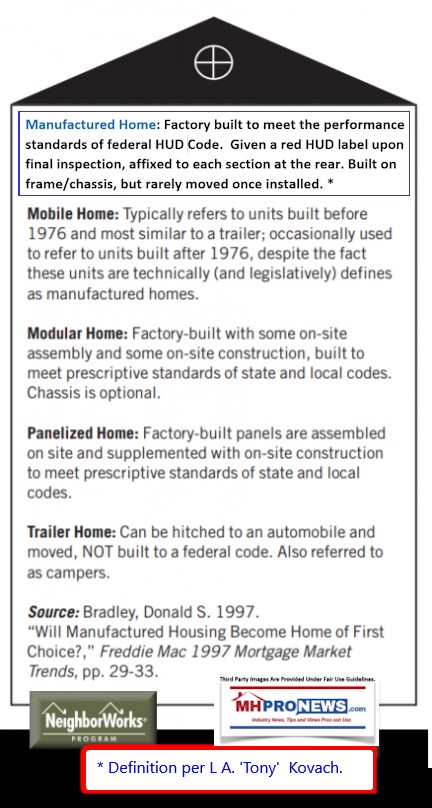

Start of NPR Transcript
STEVE INSKEEP, HOST:
About 20 million Americans live in manufactured or mobile homes. Some own the structures. Most rent the property underneath. And for many, rents are rising. Here’s Anna Casey of Illinois Public Media.
ANNA CASEY, BYLINE: Terry Baker has lived at Wilson’s mobile home park in Urbana, Ill., for more than 20 years. Baker is a retired home health worker and a proud grandmother who was looking for a place of her own after her divorce.
TERRY BAKER: I could not get over the rent. When I moved in here, my rent was $142 a month. Where else was I going to live for that kind of money?
CASEY: Baker’s rent has doubled now. It started to rise three years ago. She describes a letter that residents got.
BAKER: Dear Wilson’s resident, Dennis and I are writing to inform you we have made a difficult decision to sell Wilson’s on University.
CASEY: The local owners sold the community to Colorado-based RV Horizons. It owns mobile home parks in more than 25 states. Its business model is to buy up mom and pop parks and raise the rent. Frank Ralph works at RV Horizons and something called Mobile Home University, a so-called investors’ boot camp that teaches people how to buy mobile home parks. This is from a promotional video on their website.
(SOUNDBITE OF VIDEO)
FRANK ROLFE: You only rent the land when you own a mobile home park. And the customers are relatively easy to please. They’re just happy to have a roof over their head.
CASEY: The investor who bought the park where Baker lives and 12 others in the county has steadily increased rent and fees. Frank Rolfe wouldn’t return a request for an interview, but in this video from 2015, he laid out his business strategy.
(SOUNDBITE OF VIDEO)
ROLFE: Yeah. Well, raising the rent is simply part of the Day One purchase because often, the mom and pop has not raised the rent in years. So they’re far below market.
CASEY: It’s unclear how many mobile home parks remain family-owned, but they’re an increasingly popular investment. Just five of the biggest mobile home real estate companies now own nearly 300,000 sites. The largest is Michigan-based Sun Communities. Russell Watson is with the Federation of Manufactured Home Owners of Florida. He liked living in a Sun Community.
RUSSELL WATSON: These guys keep the parks as parks. They aren’t looking to simply displace you and send you on your way.
CASEY: In larger cities, mobile home communities are increasingly redeveloped as more profitable real estate. But Watson, who moved to a mom and pop park in Fort Pierce, says the downside is rents become less affordable when corporate owners take over.
WATSON: And they will rapidly price out people who came to those parks because it was affordable housing.
CASEY: Back in Illinois, residents like Terry Baker are worried that more rent hikes are coming.
BAKER: And if I wanted to move this place, it’s going to cost me $5,000 to $7,000 to move it and set it back up. OK? And they own almost every park around here. They got me by the butt.
CASEY: That’s why Baker and some other Illinois residents are advocating for rent-control measures. But there’s a ban on rent control in Illinois and at least 20 other states. Mobile home owners worried about escalating rents fueled by speculators are pushing for legislation to control them. For NPR News, I’m Anna Casey in Urbana, Ill.
### End of NPR transcript ###
The National Geographic (NatGeo) video posted is not part of the NPR report, but helps establish some related context for those readers who may not be familiar with RV Horizons, Mobile Home University, and “Frank and Dave” Reynolds operations.

‘Frank and Dave’ where both invited to comment, days prior to this report, and again yesterday. Reynolds responded to another inquiry recently, for a report that included his detailed statements linked here. But for whatever reasons, they did not respond to our inquiry for this report.
It’s worth noting Brad Lovin, executive director of the North Carolina Manufactured Housing Association (NCMHA) quote, shown below. Lovin’s logic is that even where the information may seemingly be close to accurate, hand-selecting what sounds bad, and/or leaving out necessary context, can cast much of the manufactured home industry in a bad light.
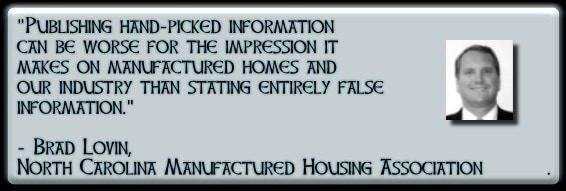
While the NPR narrative focused on larger owners, which includes RV Horizons, and those top five shown in the Manufactured Housing Institute (MHI) National Communities Council (NCC) list below, there are numerous details that NPR left out. Some of those are found in the MHProNews infographic, further above.
At the time the list below was compiled by the NCC, the top 5 manufactured home community operators would have had some 296,087 sites. While significant, what NPR failed to mention is that there are an estimated 4.2 million land lease sites in about 44,000 manufactured home communities nationally. So, the image painted by the NPR narrative is skewed for lack of data and context.
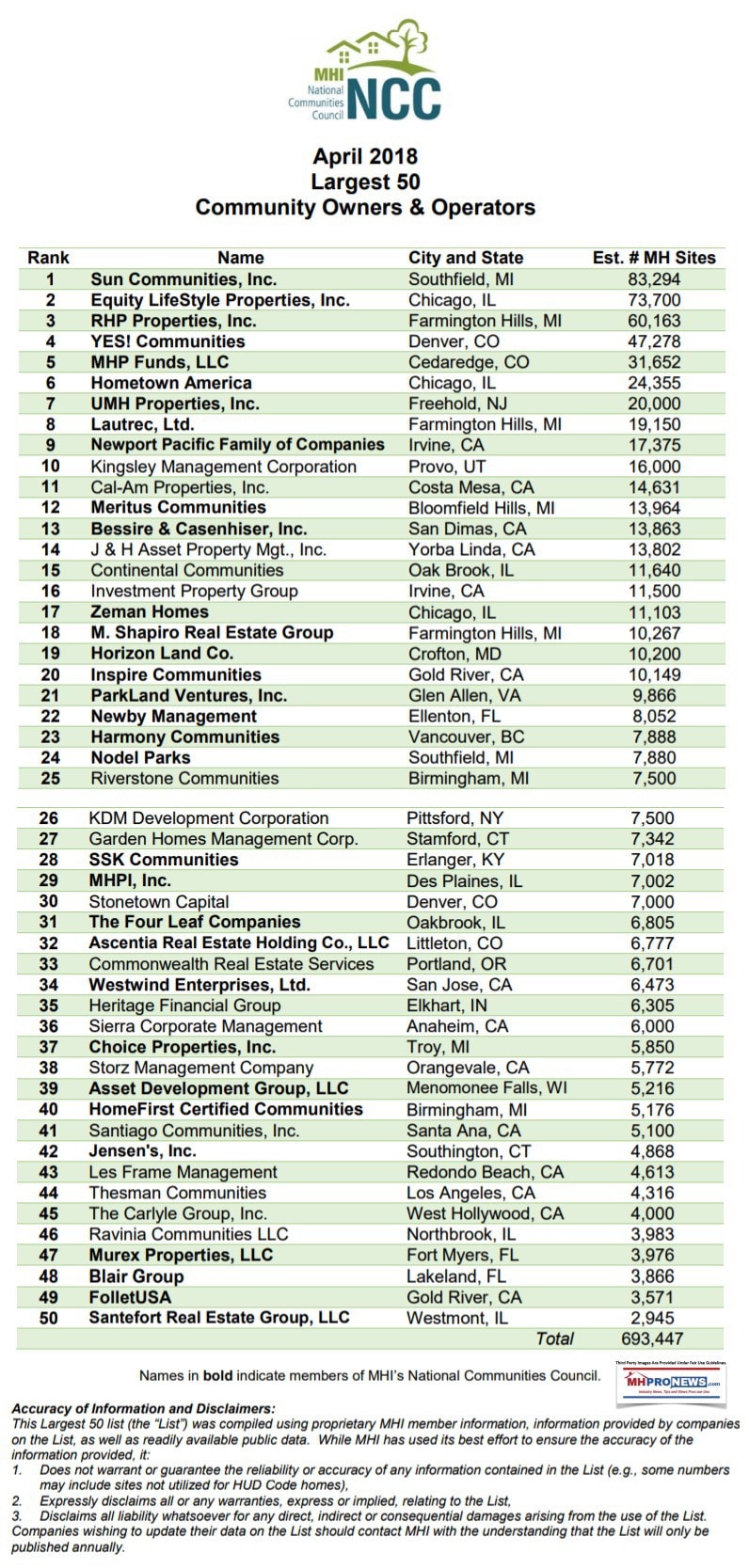
Also missing are disclosures by NPR, regarding possible conflicts of interest in their reports.
Among them are the numerous ties between “Frank and Dave” operations and Berkshire Hathaway brands operating in manufactured housing. Why is that important?
That’s perhaps just part of the biggest surprise.
The following is another case of “follow the money” and the truth hiding in plain sight. What follows is per the Gates Foundation website.
Takeaways? Facts and Implications?
MHLivingNews and MHProNews have previously documented that Buffett money has flowed through other organizations into groups that have literally targeted manufactured housing. Among those targets have been “Frank and Dave” and their firms. That may or may not be with Frank or Dave’s knowledge. This portion of the report could be a surprise to them, or maybe not.
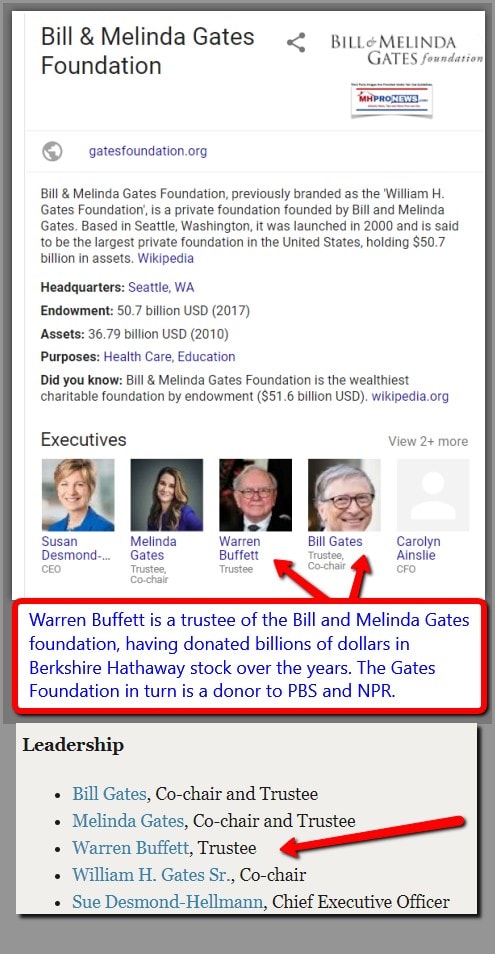
But what is certain is that there are several money-trails that have already been documented that connect Buffett-Berkshire money to news outlets and other groups that have stirred up the pot against manufactured home industry firms.
Those negative news stories in turn – while they may appear to an industry professional to be company specific, can nevertheless influence the general public perception well beyond a given company. Online quotes previously cited by MHProNews from the general public anecdotally have served to make that point.
Note that MHAction has been asked about this, as has Prosperity Now, and they’ve been mute. But does their silence on this funding/money trail matter? They’ve both apparently been paid by Buffett’s bucks, through ‘dark money’ channels. The money trail is documented. A rival resident group (see related reports, below) have likewise pointed the finger at MHAction.
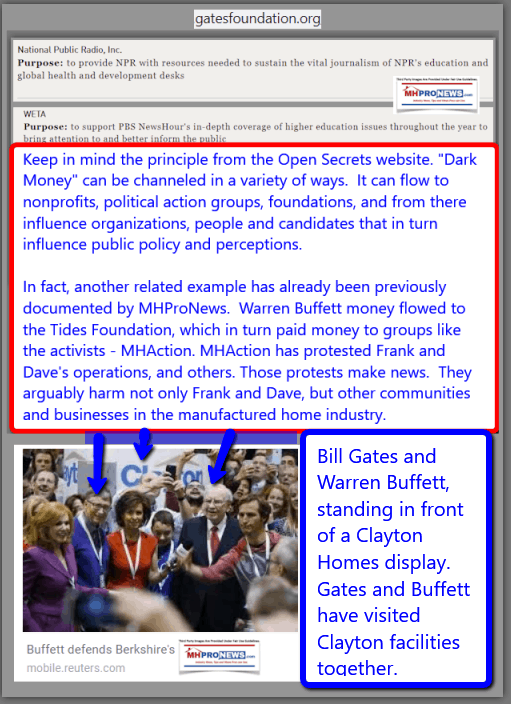
Why?
Normal business people don’t think like this. In fact, industry, public officials, advocates, and mainstream media callers have a asked MHProNews – ‘Why would Buffett’s Berkshire help fund attacks on their own industry?’
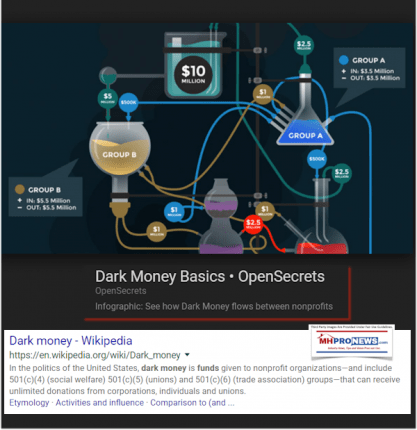
The answer is lies in “the Moat” philosophy that Buffett espouses (see related reports). They’ve even allowed or funded attacks on Clayton Homes. Specifically, how? Attacks and critiques have occurred from organizations they’ve directly or obliquely organization helped fund – such as Prosperity Now (formerly CFED) and the Center for Public Integrity.
Strange? Perhaps, but nevertheless true.
So, this recent journalistic hit on Sun Communities, RV Horizons, and Frank Rolfe delivered via NPR – or previous ones from PBS and NPR – are purportedly part of a broader pattern. It should be noted that a high-level source at 21st Mortgage are among those that have brought this pattern to the attention of MHProNews.
The money trail, facts, and evidence have included – but are not limited to – those found in the related reports, linked further below.
So this isn’t mere speculation or a wacky conspiracy theory. Rather, these are documentable facts using the ‘follow the money’ methods preached by independent journalist, Sharyl Attkisson.
Federal authorities are known to be investigating such matters. A letter from a state attorney general’s office has come into MHProNews just yesterday. It indicates they’ve been looking into issues related to “the Moat” and how it operates.
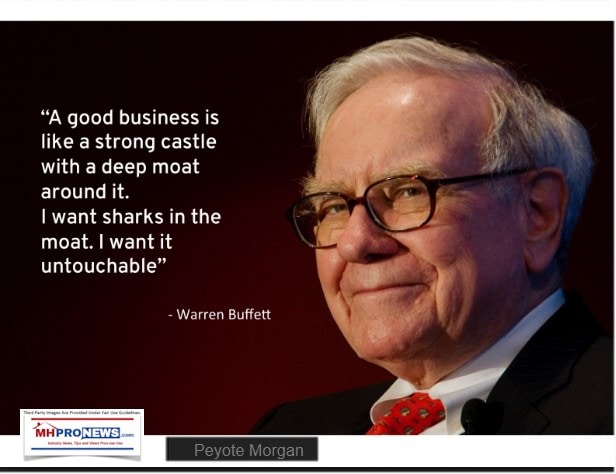
Some Satire – to Make the Points…
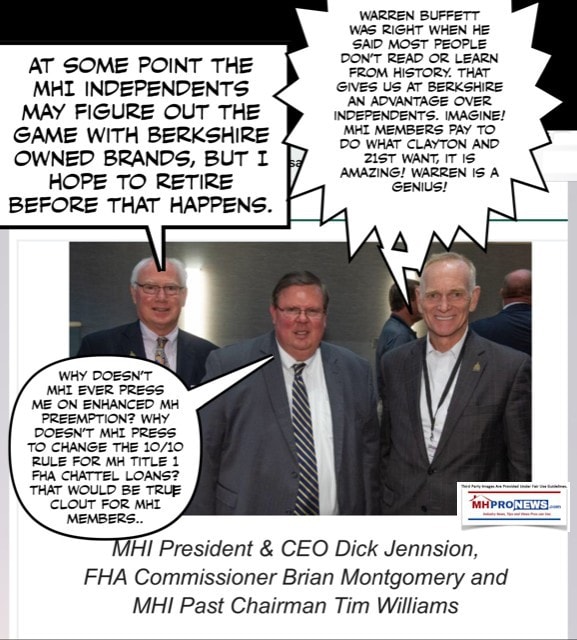
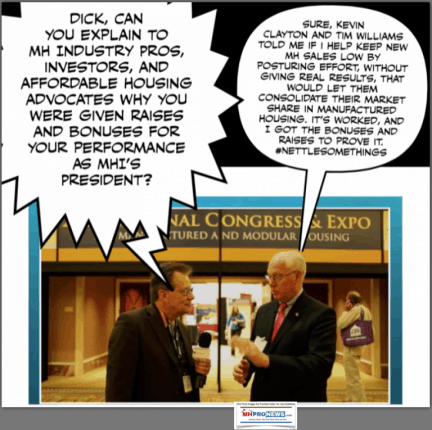
The Bottom Lines?
Industry professionals are waking up in Louisville, KY to talk shop and do business. They will be talking to Clayton Homes, 21st Mortgage, Vanderbilt Mortgage, Manufactured Housing Institute (MHI) – which is dominated by the Berkshire brands, Shaw and other firms that operate in manufactured housing.
Numerous state associations are likewise purportedly weaponized by the Berkshire brands. It should be noted that there are voices and sources associated with the above that provide news tips and other insights to MHProNews, so this isn’t a blanket condemnation. Wheat and chaff. Discernment must be used.
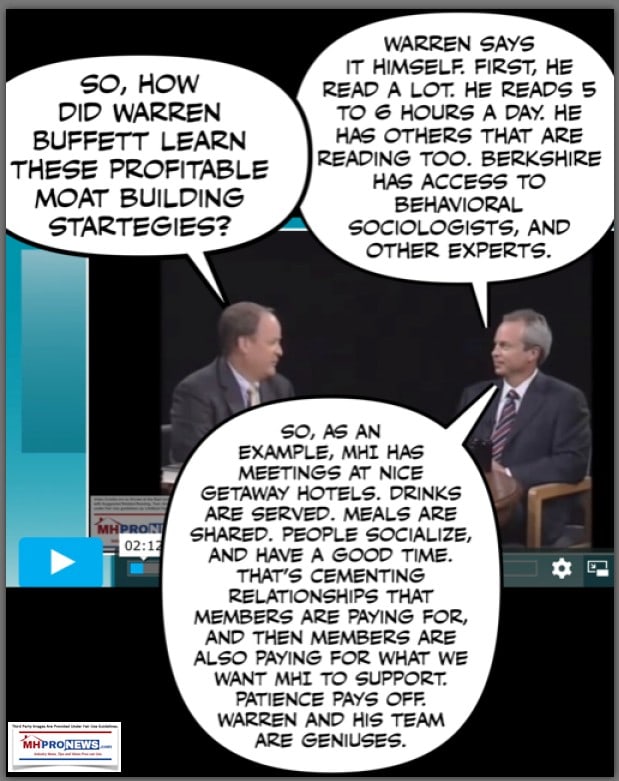
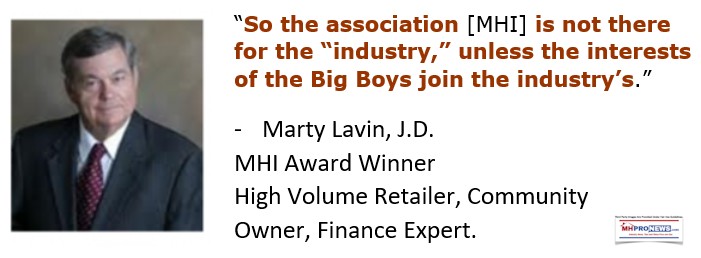
The money trail, facts, and evidence all purport to paint this picture. Warren Buffett and Berkshire – with Bill Gates’ foundation as but one funding tool – have weaponized several media and nonprofits against manufactured housing. Stunning, but just look at the evidence.
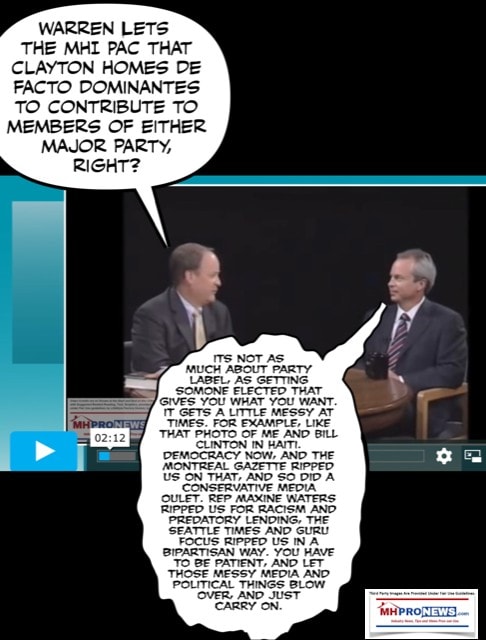
Why are shipments still at such low levels during an affordable housing crisis? Don’t reports like this one help answer that question? See the related reports, further below.
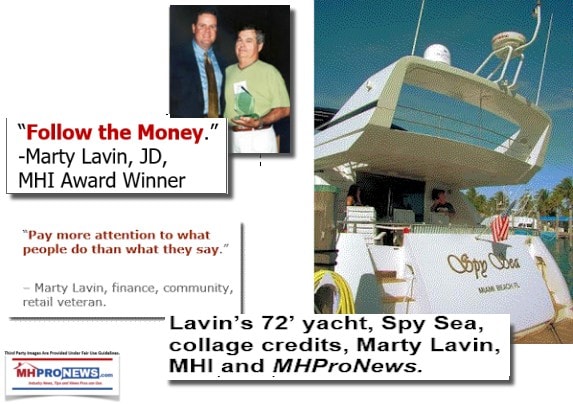
That’s MH “Industry News, Tips, and Views Pros Can Use,” © where “We Provide, You Decide.” © ## (News, analysis, and commentary.)

NOTICE: You can get our ‘read-hot’ industry-leading emailed headline news updates, at this link here. You can join the scores who follow us on Twitter at this link. Connect on LinkedIn here.
NOTICE 2: Readers have periodically reported that they are getting a better experience when reading MHProNews on the Microsoft Edge, or Apple Safari browser than with Google’s Chrome browser. Chrome reportedly manipulates the content of a page more than the other two.
(Related Reports are further below. Third-party images and content are provided under fair use guidelines.)
1) To sign up in seconds for our MH Industry leading emailed news updates, click here.

2) To pro-vide a News Tips and/or Commentary, click the link to the left. Please note if comments are on-or-off the record, thank you.
3) Marketing, Web, Video, Consulting, Recruiting and Training Re-sources

Related Reports:
You can click on the image/text boxes to learn more about that topic.
Bridging Gap$, Affordable Housing Solution Yields Higher Pay, More Wealth, But Corrupt, Rigged Billionaire’s Moat is Barrier – manufacturedhomelivingnews.com
America woke up today to division. But perhaps 75 percent (+/-) of the nation’s people could come together on a plan that demonstrably could do the following. Increase the U.S. Gross Domestic Product (GDP) by some $2 Trillion Annually, without new federal spending.
Manufactured Home Resident Group President Cautions Against MHAction, Surprising Background Reveal to Manufactured Housing Action – manufacturedhomelivingnews.com
If you scratch deeply enough, people of good will can find some common ground with others of good will. There will be disagreements between people. It has been so, since ‘the fall,’ and is expected to continue that way until time comes to an end.
“The Illusion of Motion Versus Real-World Challenges” | Manufactured Housing Association Regulatory Reform
Motion – or, more accurately, activity – in and of itself, is not necessarily synonymous with, or equivalent to, realprogress, or, in fact, any progress at all.
MHI CEO Dick Jennison’s Pledge – 500,000 New Manufactured Home Shipments
Positive, Uplifting Third-Party Reports Favor Modern Manufactured Housing, So What’s Going Wrong?

























